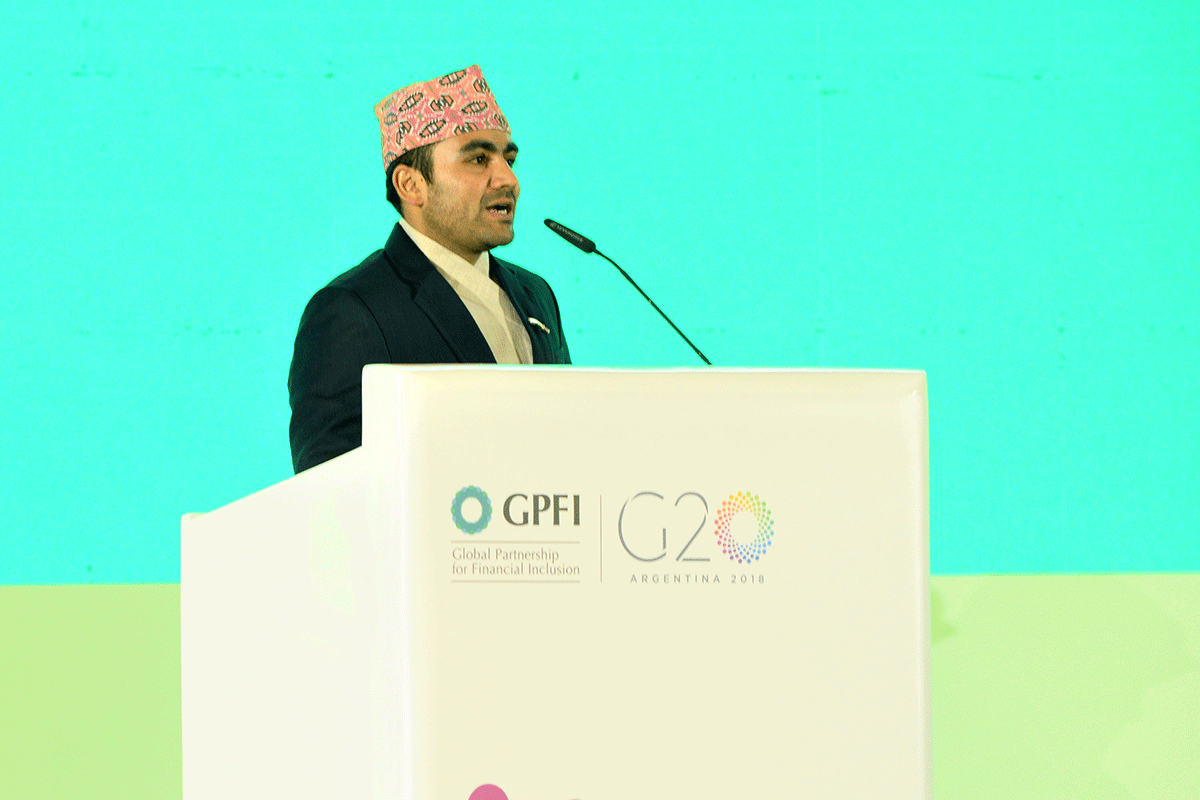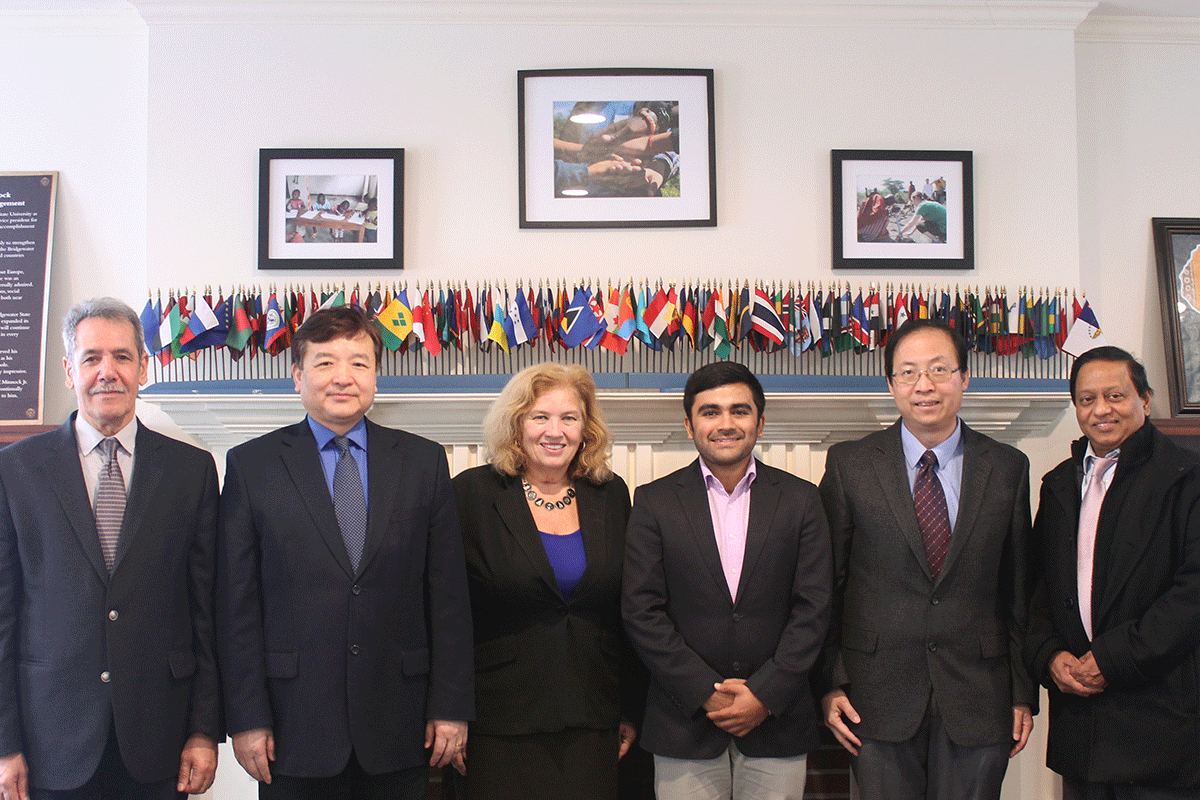
Prakash Koirala has been working to promote financial literacy and financial inclusion in Nepal since 2009. He worked as a consultant with the Central Bank of Nepal in framing a financial literacy book. He founded FINLIT Nepal as a company working on financial inclusion that works with banks and financial institutions to design and implement financial education projects. For his work, Koirala was awarded the Child and Youth Finance Financial Education Awareness Award presented by Valerie Howarth at the British Parliament in 2015. He was selected by Western Union as a Financial Inclusion Champion from 17K applications from all over the world. He has presented papers on promoting financial literacy at various events organised by Organization Economic Cooperation and Development. He was also invited by the Ministry of Finance, the Netherlands to share his financial education program and its impact. He has received a fellowship from Harvard Kennedy School, Frankfurt Business School, Geneva University and Global Affairs Canada (Government of Canada) Fellowship on micro-finance, digital finance, financial inclusion policy, SMEs and Housing. He is the author of FINLICO- comic book on financial literacy and a TEDx Speaker. He was one of the US Embassy Youth Council Members for 2016-2017. He is serving as a Global Shaper in World Economic Forum and One Young World Ambassador. He is a visiting faculty of Bridgewater State University.
In an email interview with B360, Koirala shared the workings of FINLIT Nepal and stressed on the importance of financial literacy. Excerpts:

What led to the start of FINLIT Nepal?
One day in 2009 I heard some quarrelling at a neighbour’s house in Dolakha. It was related to some monetary issue. The next day, I met the family’s son and mother and heard about their struggles. That is when I understood the correlation between finance and household discord. After that, I started to educate a few people in Dolakha itself and did a pilot program in Bajhang, a remote district of Nepal. I organised a session in Kathmandu targeted to high school students from remote places using what I had found on Google and on the basis of my learning and experience. I could see a change in them afterwards. Winning a Global Award at the House of Lords in 2015 encouraged me to do more. I volunteered from 2009 to 2015. After I won the award in 2015, I started to approach banks and financial institutions and that led to starting my own company in 2017. Since then Gaurav Thapa, another team member and I are working on this space.Could you walk us through how FINLIT functions?
FINLIT Nepal is a leading, independent service provider of financial literacy and financial education- technology solutions. The organisation develops financial education programs for organisations that inform, engage, motivate and empower consumers towards financial independence and financial discipline. It seeks to improve the financial health and capability of each individual. Our financial education programs deliver meaningful value and measurable results to our partners and clients by engaging consumers, building customer loyalty, and connecting consumers to relevant products and services in a responsible way. We have worked with the Central Bank of Nepal, different banks and financial institutions in Nepal, Save the Children, FINMANGO-USA, a+b=3-France, high schools and colleges and local municipalities.What were the earlier major roadblocks while working with the communities, government and financial institutions?
Network and capital were the major roadblocks. It was a really hard time convincing people and institutions. There wasn’t a national framework of financial literacy and it was hard to synchronise all the works. In some places, local people demanded a daily allowance just because of their impression of development organisations. These days, expanding the outreach has been an arduous task just because of limited capital and lack of proper partnership. Otherwise, the organisations we work with and the people around us always support us; which is our lifeline. The Central Bank of Nepal has recently published its national strategy. With this, we are expecting banks and financial institutions could be supportive in the future.What are the frequently encountered difficulties in the course of working with low-income communities and migrant workers?
Microcredit has been so tough in the rural parts of Nepal in the absence of proper financial education. Poor people are getting poorer every day. Microcredit is not getting the credit it deserves. There is a huge gap in terms of educating and mentoring poor people before offering financial products. For the poor people at the bottom of the pyramid, counselling and educational tips and tools become their lifeline. Working with migrant workers’ family, I found that most money transfers take place once a month: on average 75-80% migrants from the region send money back home at least once every month, while the frequency of money transfer may depend on factors such as regularity of income earned, the intensity of the needs of the family receiving remittances, the use of remittances and the channel used. Most users of remittance are not using that money in a productive sector especially because they lack financial education. There is a plenty of room for doubt and fear for migrant workers for their money. I think the reason is that migrant worker families are still outside of the formal financial sector, they lack financial education, and migrants themselves are unlikely to have experience using financial products before they migrate. We share our ground story with stakeholders on instituting migrant-friendly financial services including a digital financial diary. In some places, we have implemented it and it has worked out tremendously well. We have covered 50 of the 77 districts of Nepal. Our programs have served more than 180,000 people. In the impact of our work, we have seen 83% of our participants diversify their income source by starting new endeavours. These include learning new skills to be employed or starting an enterprise by working from their homes. Youth aged 19-25 are on the start-up business path inspired by our project. Our work with local community bodies has enabled members to form their own SMEs and employ themselves. The investment is done by the members of the local community themselves with the help of the government, cooperatives and MFI loans. In our fields of coverage, we have helped 36 SMEs consisting of members of the community we trained and helped gather investment. Our work with farmers has helped establish and increase dairy processing units, meat and improved integration of technology to assist in farming. These include enabling farmers to access the nearest markets with better prices and crop insurances.
What can organisations like FINLIT do for an underdeveloped country like Nepal? What do you consider to have achieved so far?
My guru mantra is When you have a pure heart and clear intention, nothing can deter you and nature will support you. It applies to organizations like ours. If we are really worried about our financial ecosystem, if we are really curious about the digital generation, if we are really focused to giving back to the community, we all can start with a small community. I would ask the young generation to focus their talents on solving the basic problems of people in a developing country. Representation is an important step towards financial inclusion, so I hope that sharing stories from the ground will inspire others who read them to build policies and implement strategies. I always wanted to be a community builder decorated with hard work and devotion.What are the takeaways for FINLIT having worked towards financial literacy all these years?
The capacity of low-income generating communities and migrant workers to engage in local economic development doesn’t happen on its own. It requires that organisations dedicate time and resources to nurture community-building skills and values. Some organisations are spending billions to teach skills but in the context of Nepal, we also need to focus on values. There are a plenty of policies and resources, however they are not touching the lives of poor people. I want to share another story. Together with Accountability Lab, we organised the state offer program in Lalitpur for a whole month which helped 55 households to understand their rights to take government services from the local government plus their responsibilities to make that community vibrant, happening and building values. We did that by bringing together financial institutions, the private sector, non-profits, public officials, government agencies, researchers and practitioners to identify and address challenges that confront communities and helped them to identify economic development initiatives. That was our biggest practical lesson to internalise the power of working together. Another takeaway from FINLIT having worked towards financial literacy all these years is the importance of building a long-lasting relationship with the communities.Congratulations on being recognised for your endeavour by Forbes 30 Under 30 Asia 2021. Besides, FINLIT has also been recognised multiple times for its exemplary works. What do awards and recognition entail?
I take awards and recognitions as a power booster plus a realisation of an altruistic act. I am so fortunate to have mentors who are so humble and who help me to purify my intention, thoughts and emotions. I always make sure my voice and actions are heard and felt.What are you and FINLIT currently working on?
Currently, I am taking financial inclusion policy course at Columbia University. It is a virtual course because of Covid 19. I am also working with Canadian Bank in this space as well. Once everything settles down, we will resume our fieldwork in implementing digital financial education, building partnerships and working with local government to push financial literacy and moral education in a curriculum.
Published Date: May 29, 2021, 12:00 am
Post Comment
E-Magazine
RELATED Face 2 Face



.jpg)
.jpg)
.jpg)